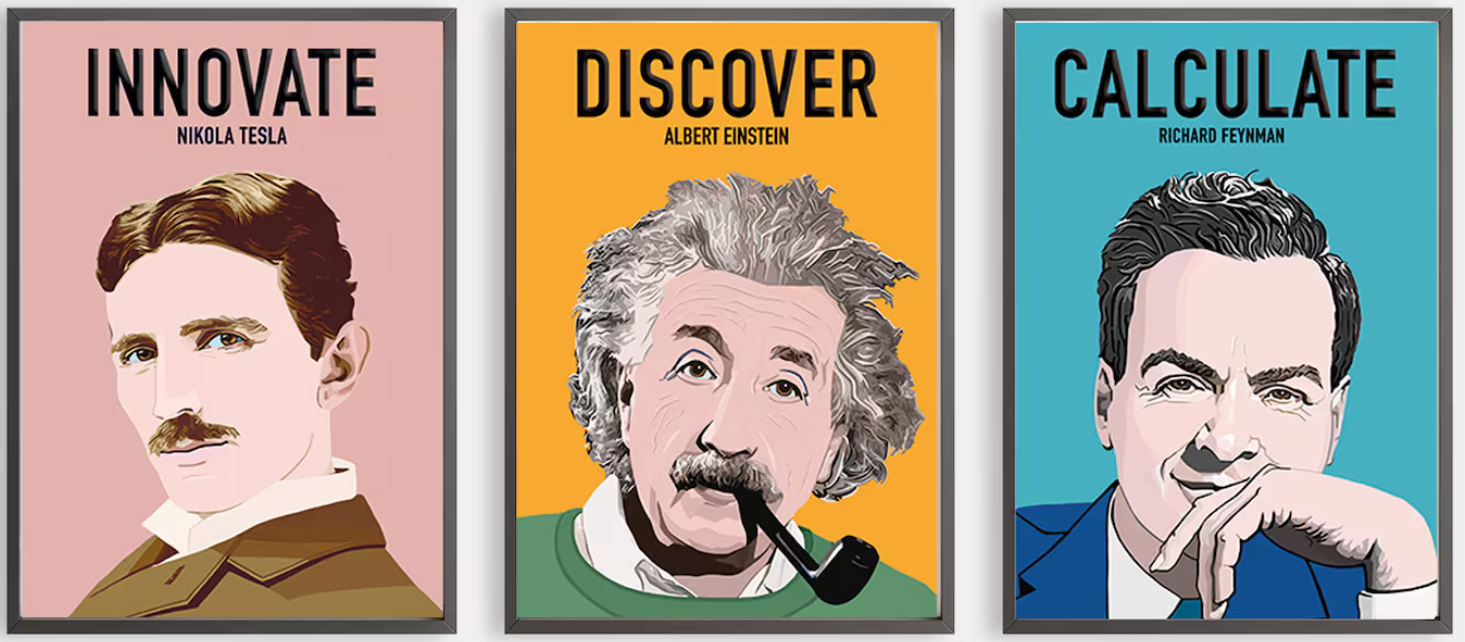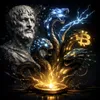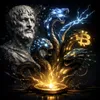In a world of growing instability – economic, ecological, and social – an invisible order is beginning to assert itself. An order not controlled by human hands, but consisting of pure mathematical principles, energetic effort, and universal transparency: Bitcoin .
But what if we asked the great minds of physics who, with their thinking, reordered space, time, energy, and information? What would Einstein , Hawking , Feynman , Tesla , and Maxwell have thought about a system that generates digital trust from energy? Whose consensus mechanism consists not of votes, but of physical work?
In this article, we conduct a thought experiment. We take the documented principles, ethics, and insights of these five physicists and examine how strongly they resonate with the Bitcoin system. What emerges is a commitment to decentralization, to order through energy, to scarcity as a principle—and to the hope for a system that prevents decay.
1. Albert Einstein: Energy, Work and Responsibility
“Energy cannot be created or destroyed, it can only be changed from one form to another.”
Albert Einstein understood energy not as a concept, but as the fundamental structure of reality . His famous formula E = m * c^2 describes energy as a substance. Applying this to Bitcoin, we see that electrical energy is irreversibly transformed into information – through hashes, through blocks, through security.
Bitcoin is energy in information form.
But that's not all. Einstein was deeply influenced by a sense of responsibility . He warned early on about the dangers of unchecked power, saying:
“Unthinking respect for authority is the greatest enemy of truth.”
In a world where central banks create money out of thin air, Einstein would see a decentralized, mathematically regulated monetary system as the natural answer. Bitcoin is not unregulated—it is algorithmically regulated. With a level of transparency that requires no institution.
Einstein would have viewed Bitcoin as an experiment in converting energy into long-term trust.
He wouldn't have viewed it as an investment, but rather as a measure of order in a derailing world. Bitcoin isn't perfect in this regard—but it follows a principle he respected: causality through regularity, not arbitrariness.
2. Stephen Hawking: Entropy, Singularity and Information Preservation
“The increase of disorder or entropy is what distinguishes the past from the future.”
Stephen Hawking thought in terms of the arrows of time, singularities, and entropy. He was fascinated by the second law of thermodynamics: that order always decays. But he sought places where this trend is halted or redirected —black holes, the early universe, information flows.
Bitcoin would have been such a place for Hawking.
What does mining do, thermodynamically speaking? It transforms disciplined energy expenditure into information structure. Each block is a small act against chaos: irreversible, traceable, mathematically embedded in time. Bitcoin is an entropy management system.
Hawking would have seen Bitcoin as an economic singularity. A point at which the collapse of existing systems becomes irreversible—and is replaced by a new order. Not through revolution, but through information.
"We are just an advanced breed of monkeys on a minor planet... but we can understand the universe. That makes us something very special."
He would have recognized this ability to create order in Bitcoin: a system that creates global integrity without central intelligence, but with simple computational logic. Hawking was also convinced that information preservation is crucial—and that is precisely what Bitcoin is: an indelible ledger.
3. Richard Feynman: Empiricism over Theory – Bitcoin as a Working Experiment
“It doesn’t matter how beautiful your theory is… if it doesn’t agree with experiment, it’s wrong.”
Feynman was allergic to ideological systems. He was a pragmatist, a skeptic, a playful child. For him, the only thing that mattered was: Does it work? Can it be tested?
Bitcoin works. It doesn't need theory to work. It only rewards when real work has been done – cryptographically measurable. No belief, no rhetoric, no opinion counts. Only the hash.
Feynman would have loved the proof-of-work system . Because it rewards effort, not intelligence. And it's open: anyone can participate, no one can cheat. That's scientific fairness.
He also said:
"There are 10¹¹ stars in the galaxy. That used to be a huge number. But it's only a hundred billion. It's less than the national deficit!"
His humor about debt would be more relevant today than ever. Feynman considers fiat currencies mathematical nonsense because they are based on models that cannot be measured. Bitcoin, on the other hand, is a system that measures itself—through computing power, hash rate, and block time.
For Feynman, Bitcoin would be the first economic experiment to prove itself.
4. Nikola Tesla: Frequency, Energy and Global Freedom
“If you want to find the secrets of the universe, think in terms of energy, frequency and vibration.”
Tesla thought of the world not in categories, but in fields. He wanted to make energy free – for everyone. A global wireless network for electricity. His vision was destroyed by business interests. But today, a different network exists: Bitcoin.
Bitcoin transforms energy → frequency → value . Its block time is rhythmic (10 minutes). Its computing power is like a global field—invisible, but real. And it belongs to no one.
For Tesla, Bitcoin is the first global energy mechanism not controlled by monopolies . Mining farms, powered by sun, wind, and water, supply energy to a neutral system. No central overseers, no meters, no permissions.
"The present is theirs; the future, for which I really worked, is mine."
Tesla would not see Bitcoin as speculation, but as the manifestation of his dream : free, uncensorable energy conversion – not into light, but into freedom.
His idea of transmitting energy through resonance finds its echo in the Bitcoin network: signals travel, values flow, trust develops – without a central transmitter.
5. James Clerk Maxwell: Fields, Immutability and Global Synchronization
“Thoroughly conscious ignorance is the prelude to every real advance in science.”
Maxwell formulated the equations that described light and magnetism as field phenomena. In doing so, he laid the foundation for everything that is digital today. His work was globally synchronizing —it ultimately made the internet, GPS, and Bitcoin possible.
Bitcoin is a globally synchronized system that pulsates through time and space like an electromagnetic field. Every node knows the state of the network. There's no center, just rules.
Maxwell loved invariance. His equations apply everywhere in the universe. Bitcoin follows this ideal: His rules apply everywhere, whether in Nigeria, Venezuela, or Berlin. 21 million. 210,000 blocks. 10 minutes.
“The mind of man can see a thousand truths, but the body must obey one law.”
Bitcoin is such a law: it allows for individual freedom but enforces adherence to common rules – through mathematics.
The joint appeal of the five spirits
What would these five men have said if they were together today to look at the parasitic debt and surveillance system of today? They would have argued, laughed, measured—but they would probably have agreed on one point:
A system that converts energy into regulated information, decentralized and open to everyone, is the only logical step forward.
- Einstein would have said: Responsibility for future generations begins with honest money.
- Hawking would have warned: Without order in our financial systems, our civilization will disintegrate faster than the universe.
- Feynman would have laughed and said: Bitcoin works – that’s all that matters.
- Tesla would have quietly replied: That is the energy flow I meant.
- Maxwell would have added: And he obeys the same fields that I once described.
To the reader:
If you understand this system—not superficially, but deeply—then you bear responsibility for yourself and future generations. Bitcoin is not a bet. It is a tool. A law of nature in economic form.
But it's not just physicists who would choose Bitcoin. If you're interested in the intersection of great thinkers and Bitcoin, read more here about the Bitcoiner's categorical imperative , inspired by Immanuel Kant.
Why “All In Bitcoin” is the most moral thing you can do with your capital.
- Bitcoin
- Physics
- Originals
- english
- lang:en
- level:expert
- read:short
- author:sinautoshi
- topic:mining
- topic:basics

Sinautoshi
#Bitcoin only - #GetOnZero - united we fix the money (supply to 21M BTC)




Related Posts
The philosophy of digital sovereignty
Feb 22, 2026
Die Philosophie der digitalen Souveränität
Feb 22, 2026
Inflacija: Skriti davek, ki požira vašo kupno moč – kako jo premagati s trdnim denarjem - Burek zgodba
Feb 15, 2026